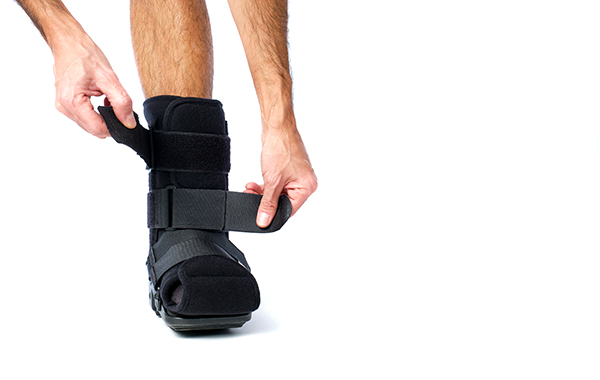Heel Pain
UNDERSTANDING HEEL PAIN
Overview
Heel pain is often due to repeated stress or injury to the muscles and tissues in the foot. However, there are also rare but serious conditions that can cause similar pain. Seeing a podiatrist is a good idea to get an accurate diagnosis.
Heel pain is commonly called plantar fasciitis or heel spur syndrome. Although these terms often describe the same problem, they can involve different details that affect how we treat the condition.

Plantar Fasciitis
Recent-onset heel pain is when you first start feeling pain or discomfort in the bottom of your foot, usually lasting less than 6-8 weeks. This pain often comes from inflammation in the plantar fascia, a thick band of tissue that runs from the ball of your foot to your heel.
During this early stage, it’s easier to manage because the main goal is to reduce the inflammation. In Singapore, however, by the time people see a foot specialist, their condition might be more severe. Often, the inflammation has already turned into a chronic issue, and the original pain might have become much worse, or even led to a tear in the plantar fascia. When the condition has become chronic, treating the inflammation might not be as effective.

Understanding Heel Spurs and Chronic Heel Pain
Sometimes, what people call “plantar fasciitis” isn’t really an inflammation issue. Instead, it’s often due to long-term damage and weakening of the plantar fascia, the tissue along the bottom of your foot. This damage can lead to a heel spur, which shows up on X-rays as a bony growth on the heel. This is why you might hear the term “heel spur syndrome.”
In chronic cases, the plantar fascia can develop calcifications or hardening, but a heel spur itself doesn’t always cause pain. Some people have heel spurs without any pain, while others with pain may not have spurs at all. The spur is a sign of ongoing stress and damage to the plantar fascia.
A heel spur indicates that the plantar fasciitis has been around for a while. However, removing the heel spur surgically isn’t always necessary or the best solution. There are non-surgical treatments available that can help manage chronic heel pain effectively.
Will Heel Pain Affect My Walking Long-Term?
If you’ve had severe heel pain for a long time, it can change the way you walk. Some people start tip-toeing to avoid pain or become less active. This can lead to a drop in fitness and even cause other problems. Getting the right diagnosis and treatment can help reduce heel pain and prevent other issues. If left untreated, heel pain can seriously impact your ability to walk and your daily life.
Can I Just Wait for the Pain to Go Away?
Sometimes, resting and trying home remedies can help ease heel pain. However, this doesn’t tackle the underlying issue. Many people experience recurring heel pain that gets worse over time, making it harder to manage each time it flares up.
At NoFrills Podiatry, we focus on practical solutions to address the root cause of your pain. We use advanced technology and custom-made orthotic insoles tailored to your specific needs.
It’s best to see a podiatrist for an accurate diagnosis and to explore effective non-surgical treatments.
Non-Surgical Treatments for Heel Pain
There are several effective non-surgical treatments for heel pain, such as custom foot insoles, shockwave therapy, electromagnetic stimulation, sports taping, and targeted stretching exercises. With proper care and commitment to these treatments, most people experience significant improvement.
Surgery might be suggested if the pain is severe and doesn’t improve with these non-surgical methods. Our podiatrists work with experienced orthopedic surgeons who specialize in foot and ankle surgeries. They also assist with post-surgery recovery, including wound care, custom insoles, and special footwear.
Frequently Asked Questions
What Is Heel Pain?
Heel pain is discomfort or pain in the back of your foot. There are several potential causes for heel pain, with common ones being plantar fasciitis, stress fractures, and tendonitis.
What Causes Heel Pain?
Heel pain can result from various factors, often linked to injuries. These injuries generally fall into three main types:
- Acute Injuries: These happen due to a sudden event, like a sprain, fall, or fracture.
- Overuse Injuries: These occur from repeated actions that strain specific tissues, such as muscles and joints. If not treated, overuse injuries can turn into chronic issues.
- Chronic Injuries: These are long-lasting and persist for more than three months. They may not heal on their own if left untreated.
What Are The Symptoms Of Heel Pain?
Heel pain can have different symptoms depending on the cause. Common signs include:
- Swelling or stiffness at the back or bottom of the heel
- Redness or a warm feeling in the area
- Limited or painful movement
- Discomfort when pressure is applied to the heel
What is Plantar Fasciitis?
This condition affects the plantar fascia, a thick band of tissue that runs from the front of your foot to your heel. This tissue supports your foot’s arch and absorbs shock when you walk. Over time, the plantar fascia can get injured, leading to pain. Factors like having flat feet, high arches, excessive exercise, or being overweight can contribute to plantar fasciitis.
Will Heel Pain Go Away on Its Own?
Even though heel pain might get better with rest, the problems causing it usually don’t go away on their own. Activities like exercise or standing for long periods can easily make the pain return. If not properly treated, these issues can lead to serious damage, like a tear in the plantar fascia, which may require surgery to fix.
How Do I Manage Heel Pain?
Managing heel pain generally involves two main strategies:
-
Pain Relief: This can include taking pain medications, resting, using shockwave therapy, physical therapy, and other treatments to help ease the pain.
-
Addressing the Cause: This involves finding out what’s causing the heel pain and exploring solutions like custom orthotics or, in some cases, surgery. Getting early help is crucial to prevent the pain from worsening.
Book your initial podiatry visit
hello@nofrillspodiatry.com
Phone
9007 1085
Open Hours
Mondays - Sundays: 9am-6pm
We're Here Whenever You Need Us
hello@nofrillspodiatry.com
Contact Us
9007 1085
Open Hours
Monday-Sundays: 10am to 7pm
Address
About
About Us
Symptoms We Help With
FAQs
Careers
Contact Us